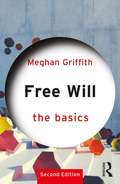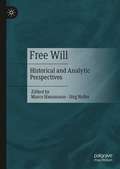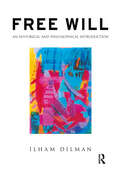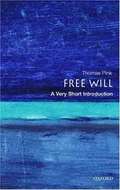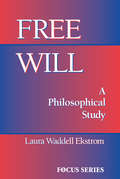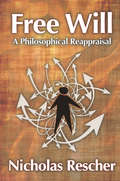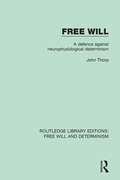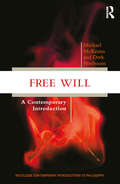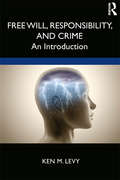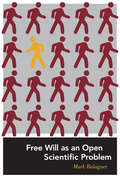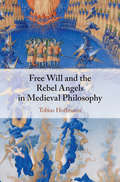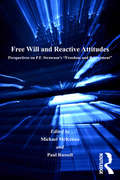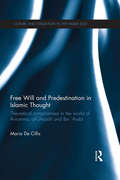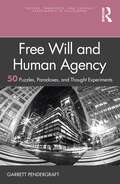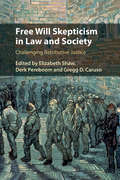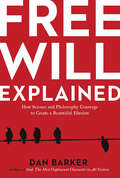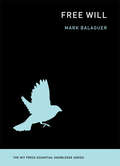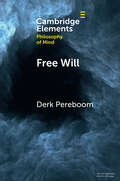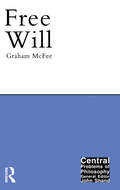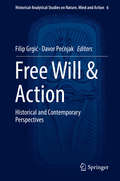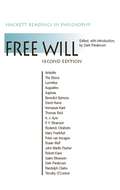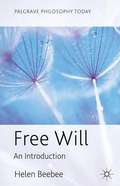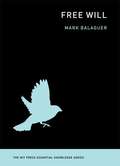- Table View
- List View
Free Will: The Basics (The Basics)
by Meghan GriffithThe question of whether humans are free to make their own decisions has long been debated and it continues to be a controversial topic today. In Free Will: The Basics readers are provided with a clear and accessible introduction to this central but challenging philosophical problem. The questions which are discussed include: Does free will exist? Or is it illusory? Can we be free even if everything is determined by a chain of causes? If our actions are not determined, does this mean they are just random or a matter of luck? In order to have the kind of freedom required for moral responsibility, must we have alternatives? What can recent developments in science tell us about the existence of free will? Because these questions are discussed without prejudicing one view over others and all technical terminology is clearly explained, this book is an ideal introduction to free will for the uninitiated.
Free Will: The Basics (The Basics)
by Meghan GriffithThe issue of whether humans are free to make their own decisions has long been debated, and it continues to be controversial today. In Free Will: The Basics Meghan Griffith provides a clear and accessible introduction to this important but challenging philosophical problem. She addresses the questions central to the topic including: Does free will exist, or is it illusory? Can we be free even if everything is determined by a chain of causes? If our actions are not determined, does this mean they are just random or a matter of luck? In order to have the kind of freedom required for moral responsibility, must we have alternatives? What can recent developments in science tell us about the existence of free will? These questions are discussed without prejudicing one view over others, and all technical terminology is clearly explained. This second edition has been revised and updated throughout, with the addition of new sections on dispositionalism, free will as self-organization, and situationism in psychology. Up-to-date suggestions for further reading and a glossary are also included, making Free Will: The Basics an ideal introduction for anyone coming to the subject for the first time.
Free Will: Historical and Analytic Perspectives
by Jörg Noller Marco HausmannThis novel contributed volume advances the current debate on free will by bridging the divide between analytic and historically oriented approaches to the problem. With thirteen chapters by leading academics in the field, the volume is divided into three parts: free will and determinism, free will and indeterminism, and free will and moral responsibility. The contributors aim to initiate a philosophical discourse that profits from a combination of the two approaches. On the one hand, the analytic tools familiar from the debate – arguments, concepts, and distinctions – can be used to sharpen our understanding of classical philosophical positions. On the other hand, the rich philosophical tradition can be reconstructed so as to inspire new solutions. In recent years, the problem of free will has received special attention in the analytic arena. This is the first anthology to combine historical and analytic perspectives, significantly furthering the debate, and providing a crucial resource to academics and advanced students alike.
Free Will: An Historical and Philosophical Introduction
by Ilham DilmanWhat is the place of human free will in our lives if all our actions are the result of some other cause? Does our processing unconscious beliefs or desires make us less free? Is our free will necessarily restricted if we do not choose our own beliefs? The debate between free will and its opposing doctrine, determinism, is one of the key issues in philosophy. Free Will: An historical and philosophical introduction provides a comprehensive introduction to this highly important question and examines the contributions made by sixteen of the most outstanding thinkers from the time of early Greece to the twentieth century:*Homer *Sophocles *Platto *Aristotle *St Augustine *St Thomas Aquinas *Descaartes *Spinoza *Hume *Kant *Schopehauer *Freud *Sartre *Weil *Wittgenstein *Moore Ilham Dilman brings together all the dimensions of the problem of free will with examples from literature, ethics and psychoanalysis. Drawing out valuable insights from both sides of the free will-determinism divide, and he provides an accessible and highly readable introduction to this perennial problem.
Free Will: A Very Short Introduction
by Thomas PinkEvery day we seem to make and act upon all kinds of free choices - some of them trivial, and some so consequential that they change the course of one's life, or even the course of history. But are these choices really free? Or are we compelled to act the way we do by factors beyond our control? Is the feeling that we could have made different decisions just an illusion? And if our choices are not free, is it legitimate to hold people morally responsible for their actions?
Free Will: A Philosophical Study (Focus Ser.)
by Laura EkstromIn this comprehensive new study of human free agency, Laura Waddell Ekstrom critically surveys contemporary philosophical literature and provides a novel account of the conditions for free action. Ekstrom argues that incompatibilism concerning free will and causal determinism is true and thus the right account of the nature of free action must be indeterminist in nature. She examines a variety of libertarian approaches, ultimately defending an account relying on indeterministic causation among events and appealing to agent causation only in a reducible sense. Written in an engaging style and incorporating recent scholarship, this study is critical reading for scholars and students interested in the topics of motivation, causation, responsibility, and freedom. In broadly covering the important positions of others along with its exposition of the author's own view, Free Will provides both a significant scholarly contribution and a valuable text for courses in metaphysics and action theory.
Free Will: A Philosophical Reappraisal
by Nicholas RescherThis volume is a reassessment of free will and, as such, seeks to answer the question: Do humans ever act under the guidance of the will? To determine if humans have free will, Rescher first examines what exactly free will is and how it should function. While the literature on the subject of free will is vast, a good deal still remains to be done to avert obscurity and confusion. Rescher leads the reader through a conceptual web of distinctions that, taken together, provide a satisfying contribution to philosophical thought on free will in general.Rescher sharpens his highly conceptual assessment by making distinctions--between productive (or metaphysical) and moral (or motivational) freedom, free decision and free action, motivational and causal determination of choices, durational events and the instantaneous eventuations that mark their commencements and completions, and between pre-determination and precedence determination. In doing so, he also examines the role of nature, nurture, and free choice. Each of these distinctions defines the characteristics of free will and averts a group of problems and difficulties traditionally ascribed to the doctrine. With these in place, it becomes possible to validate the compatibility between freedom of the will and a certain special mode of determinism.Rescher's conceptual perspective in this age-old debate opens up the prospect of naturalizing free volition through its natural emergence via the same process of evoking development that has seen the emergence of intelligence on the world's stage. That is, only after the conceptual issues are settled, can the question of how things actually stand be answered. This work will be an important reassessment of free will not just because of the author's final conclusion, but because of the issue-illuminating path he takes to get there.
Free Will: A Defence Against Neurophysiological Determinism (Routledge Library Editions: Free Will and Determinism #4)
by John ThorpThe problem of freedom and determinism is one of the most enduring, and one of the best, problems in philosophy. One of the best because it so tenaciously resists solution while yet always seeming urgent, and one of the most enduring because it has always been able to present itself in different ways to suit the preoccupations of different ages. This book, first published in 1980, sets out to defend free will: it elaborates a sober and systematic case for libertarianism in the face of the overwhelming threat that is posed by the scientific study of the brain.
Free Will: A Contemporary Introduction (Routledge Contemporary Introductions to Philosophy #5)
by Michael Mckenna Derk PereboomAs an advanced introduction to the challenging topic of free will, this book is designed for upper-level undergraduates interested in a comprehensive first-stop into the field's issues and debates. It is written by two of the leading participants in those debates--a compatibilist on the issue of free will and determinism (Michael McKenna) and an incompatibilist (Derk Pereboom). These two authors achieve an admirable objectivity and clarity while still illuminating the field's complexity and key advances. Each chapter is structured to work as one week's primary reading in a course on free will, while more advanced courses can dip into the annotated further readings, suggested at the end of each chapter. A comprehensive bibliography as well as detailed subject and author indexes are included at the back of the book.
Free Will, Responsibility, and Crime: An Introduction
by Ken M. LevyIn his book, philosopher and law professor Ken Levy explains why he agrees with most people, but not with most other philosophers, about free will and responsibility. Most people believe that we have both – that is, that our choices, decisions, and actions are neither determined nor undetermined but rather fully self-determined. By contrast, most philosophers understand just how difficult it is to defend this "metaphysical libertarian" position. So they tend to opt for two other theories: "responsibility skepticism" (which denies the very possibility of free will and responsibility) and "compatibilism" (which reduces free will and responsibility to properties that are compatible with determinism). In opposition to both of these theories, Levy explains how free will and responsibility are indeed metaphysically possible. But he also cautions against the dogma that metaphysical libertarianism is actually true, a widespread belief that continues to cause serious social, political, and legal harms. Levy’s book presents a crisp, tight, historically informed discussion, with fresh clarity, insight, and originality. It will become one of the definitive resources for students, academics, and general readers in this critical intersection among metaphysics, ethics, and criminal law. Key features: Presents a unique, qualified defense of "metaphysical libertarianism," the idea that our choices, decisions, and actions can be fully self-determined. Written clearly, accessibly, and with minimal jargon – rare for a book on the very difficult issues of free will and responsibility. Seamlessly connects philosophical, legal, psychological, and political issues. Will be provocative and insightful for professional philosophers, students, and non-philosophers.
Free Will as an Open Scientific Problem
by Mark BalaguerAn argument that the problem of free will boils down to an open scientific question about the causal histories of certain kinds of neural events.In this largely antimetaphysical treatment of free will and determinism, Mark Balaguer argues that the philosophical problem of free will boils down to an open scientific question about the causal histories of certain kinds of neural events. In the course of his argument, Balaguer provides a naturalistic defense of the libertarian view of free will.The metaphysical component of the problem of free will, Balaguer argues, essentially boils down to the question of whether humans possess libertarian free will. Furthermore, he argues that, contrary to the traditional wisdom, the libertarian question reduces to a question about indeterminacy—in particular, to a straightforward empirical question about whether certain neural events in our heads are causally undetermined in a certain specific way; in other words, Balaguer argues that the right kind of indeterminacy would bring with it all of the other requirements for libertarian free will. Finally, he argues that because there is no good evidence as to whether or not the relevant neural events are undetermined in the way that's required, the question of whether human beings possess libertarian free will is a wide-open empirical question.
Free Will and the Rebel Angels in Medieval Philosophy
by Tobias HoffmannIn this book Tobias Hoffmann studies the medieval free will debate during its liveliest period, from the 1220s to the 1320s, and clarifies its background in Aristotle, Augustine, and earlier medieval thinkers. Among the wide range of authors he examines are not only well-known thinkers such as Thomas Aquinas, Duns Scotus, and William of Ockham, but also a number of authors who were just as important in their time and deserve to be rediscovered today. To shed further light on their theories of free will, Hoffmann also explores their competing philosophical explanations of the fall of the angels, that is, the hypothesis of an evil choice made by rational beings under optimal psychological conditions. As he shows, this test case imposed limits on tracing free choices to cognition. His book provides a comprehensive account of a debate that was central to medieval philosophy and continues to occupy philosophers today.
Free Will and the Brain
by Walter GlannonNeuroscientific evidence has educated us in the ways in which the brain mediates our thought and behavior and, therefore, forced us to critically examine how we conceive of free will. This volume, featuring contributions from an international and interdisciplinary group of distinguished researchers and scholars, explores how our increasing knowledge of the brain can elucidate the concept of the will and whether or to what extent it is free. It also examines how brain science can inform our normative judgments of moral and criminal responsibility for our actions. Some chapters point out the different respects in which mental disorders can compromise the will and others show how different forms of neuromodulation can reveal the neural underpinning of the mental capacities associated with the will and can restore or enhance them when they are impaired.
Free Will and Reactive Attitudes: Perspectives on P.F. Strawson's 'Freedom and Resentment'
by Paul Russell Michael MckennaThe philosophical debate about free will and responsibility has been of great importance throughout the history of philosophy. In modern times this debate has received an enormous resurgence of interest and the contribution in 1962 by P.F. Strawson with the publication of his essay "Freedom and Resentment" has generated a wide range of discussion and criticism in the philosophical community and beyond. The debate is of central importance to recent developments in the free will literature and has shaped the way contemporary philosophers now approach the problem. This volume brings together a focused selection of the major contributions and reactions to the free will and responsibility debate inspired by Strawson's contribution. McKenna and Russell also provide a comprehensive overview of the debate. This book will be of great value to scholars of Strawson and those interested in the free will debate more generally.
Free Will and Predestination in Islamic Thought: Theoretical Compromises in the Works of Avicenna, al-Ghazali and Ibn 'Arabi (Culture and Civilization in the Middle East)
by Maria De CillisThe subject of "human free-will" versus "divine predestination" is one of the most contentious topics in classical Islamic thought. By focusing on a theme of central importance to any philosophy of religion, and to Islam in particular, this book offers a critical study of the intellectual contributions offered to this discourse by three key medieval Islamic thinkers: Avicenna, al-Ghāzālī and Ibn ʿArabī. Through investigation of primary sources, Free Will and Predestination in Islamic Thought establishes the historical, political and intellectual circumstances which prompted Avicenna, al-Ghāzālī and Ibn ʿArabī’s attempts at harmonization. By analysing the theoretical and linguistic ‘techniques’ which were employed to convey these endeavours, this book demonstrates that the three individuals were committed to compromise between philosophical, theological and mystical outlooks. Arguing that the three scholars’ treatments of the so-called qaḍā wa’l-qadar (decree and destiny) and ikhtiyār (free-will) issues were innovative, influential and fundamentally more complex than hitherto recognized, this book contributes to a fuller understanding of Islamic intellectual history and culture and will be useful to researchers interested in Islamic Studies, Religion and Islamic Mysticism.
Free Will and Human Agency: 50 Puzzles, Paradoxes, and Thought Experiments (Puzzles, Paradoxes, and Thought Experiments in Philosophy)
by Garrett PendergraftIn this new kind of entrée to contemporary discussions of free will and human agency, Garrett Pendergraft collects and illuminates 50 of the most relevant puzzles, paradoxes, and thought experiments. Assuming no familiarity with the philosophical literature on free will, each chapter describes a case, explains the questions that it raises, briefly summarizes some of the key responses to the case, and provides a list of suggested readings. Every chapter is accessible, succinct, and self-contained. The puzzles are divided into five broad categories: the threat from fatalism, the threat from determinism, practical reason, social dimensions, and moral luck. Entries cover topics such as the grandfather paradox, theological fatalism, the consequence argument, manipulation arguments, luck arguments, weakness of will, action explanation, addiction, blame and punishment, situationism in moral psychology, and Huckleberry Finn. Free Will and Human Agency is an effective and engaging teaching tool as well as a handy resource for anyone interested in exploring the questions that have made human agency a topic of perennial philosophical interest. Key Features: Though concise overall, offers broad coverage of the key areas of free will and human agency. Describes each imaginative case directly and in a memorable way, making the cases accessible and easy to remember. Provides a list of suggested readings for each case.
Free Will Skepticism in Law and Society: Challenging Retributive Justice
by Elizabeth Shaw Derk Pereboom Gregg D. Caruso'Free will skepticism' refers to a family of views that all take seriously the possibility that human beings lack the control in action - i.e. the free will - required for an agent to be truly deserving of blame and praise, punishment and reward. Critics fear that adopting this view would have harmful consequences for our interpersonal relationships, society, morality, meaning, and laws. Optimistic free will skeptics, on the other hand, respond by arguing that life without free will and so-called basic desert moral responsibility would not be harmful in these ways, and might even be beneficial. This collection addresses the practical implications of free will skepticism for law and society. It contains eleven original essays that provide alternatives to retributive punishment, explore what (if any) changes are needed for the criminal justice system, and ask whether we should be optimistic or pessimistic about the real-world implications of free will skepticism.
Free Will Explained: How Science and Philosophy Converge to Create a Beautiful Illusion
by Dan BarkerA compelling essay on free will from an internationally recognized authority on atheism, and author of God: The Most Unpleasant Character in All Fiction. Do we have free will? And if we don&’t, why do we feel as if we do? In a godless universe governed by impersonal laws of cause and effect, are you responsible for your actions? Former evangelical minister Dan Barker (God: The Most Unpleasant Character in All Fiction) unveils a novel solution to the question that has baffled scientists and philosophers for millennia. He outlines the concept of what he calls &“harmonic free will,&” a two-dimensional perspective that pivots the paradox on its axis to show that there is no single answer—both sides are right. Free will is a useful illusion: not a scientific, but a social truth.
Free Will (The MIT Press Essential Knowledge Series)
by Mark BalaguerA philosopher considers whether the scientific and philosophical arguments against free will are reason enough to give up our belief in it. In our daily life, it really seems as though we have free will, that what we do from moment to moment is determined by conscious decisions that we freely make. You get up from the couch, you go for a walk, you eat chocolate ice cream. It seems that we're in control of actions like these; if we are, then we have free will. But in recent years, some have argued that free will is an illusion. The neuroscientist (and best-selling author) Sam Harris and the late Harvard psychologist Daniel Wegner, for example, claim that certain scientific findings disprove free will. In this engaging and accessible volume in the Essential Knowledge series, the philosopher Mark Balaguer examines the various arguments and experiments that have been cited to support the claim that human beings don't have free will. He finds them to be overstated and misguided. Balaguer discusses determinism, the view that every physical event is predetermined, or completely caused by prior events. He describes several philosophical and scientific arguments against free will, including one based on Benjamin Libet's famous neuroscientific experiments, which allegedly show that our conscious decisions are caused by neural events that occur before we choose. He considers various religious and philosophical views, including the philosophical pro-free-will view known as compatibilism. Balaguer concludes that the anti-free-will arguments put forward by philosophers, psychologists, and neuroscientists simply don't work. They don't provide any good reason to doubt the existence of free will. But, he cautions, this doesn't necessarily mean that we have free will. The question of whether we have free will remains an open one; we simply don't know enough about the brain to answer it definitively.
Free Will (Elements in Philosophy of Mind)
by Derk PereboomThis Element provides a thorough overview of the free will debate as it currently stands. After distinguishing the main senses of the term 'free will' invoked in that debate, it proceeds to set out the prominent versions of the main positions, libertarianism, compatibilism, and free will skepticism, and then to discuss the main objections to these views. Particular attention is devoted to the controversy concerning whether the ability to do otherwise is required for moral responsibility and whether it is compatible with determinism, and to manipulation arguments against compatibilism. Two areas in which the free will debate has practical implications are discussed in detail, personal relationships and criminal justice.
Free Will (Central Problems Of Philosophy Ser. #1)
by Graham McFeeThe question whether human choices and actions are causally determined or are in a way free, and the implications of this for our moral, personal and social lives continues to challenge philosophers. This book explores the determinist rejection of free will through a detailed exposition of the central determinist argument and a consideration of the responses to each of its premises. At every stage familiar examples and case studies help frame and ground the argument. The discussion is at no time peremptory and the invitation to the reader to be drawn in and to contribute to the debate as an engaged participant is palpable in the manner and approach adopted throughout. "Free Will" will be welcomed by students looking for an engaging and clear introduction to the subject, and as a rigorous exercise in philosophical argument it will serve, for the beginning student new to philosophy, as an excellent springboard into the subject more generally.
Free Will & Action: Historical and Contemporary Perspectives (Historical-Analytical Studies on Nature, Mind and Action #6)
by Filip Grgić Davor PećnjakThis book consists of eleven new essays that provide new insights into classical and contemporary issues surrounding free will and human agency. They investigate topics such as the nature of practical knowledge and its role in intentional action; mental content and explanations of action; recent arguments for libertarianism; the situationist challenge to free will; freedom and a theory of narrative configuration; the moral responsibility of the psychopath; and free will and the indeterminism of quantum mechanics. Also tackling some historical precursors of contemporary debates, taken together these essays demonstrate the need for an approach that recognizes the multifaceted nature of free will. This book provides essential reading for anyone interested in the current scholarship on free will.
Free Will
by Derk PereboomA unique anthology featuring contributions to the dispute over free will from Aristotle to the twenty-first century, Derk Pereboom's volume presents the most thoughtful positions taken in this crucial debate and discusses their consequences for free will's traditional corollary, moral responsibility.The Second Edition retains the organizational structure that made its predecessor the leading anthology of its kind, while adding major new selections by such philosophers as Spinoza, Reid, John Martin Fischer, Robert Kane, Galen Strawson, and Timothy O'Connor.Hackett Readings in Philosophy is a versatile series of compact anthologies, each devoted to a topic of traditional interest. Selections include classical, modern, and contemporary writings chosen for their elegance of exposition and success at stimulating thought and discussion.
Free Will
by Helen BeebeeThis comprehensive introductory guide includes discussion of the major contemporary positions on compatibilism and incompatibilism, and of the central arguments that are a focus of the current debate, including the Consequence Argument, manipulation arguments, and Frankfurt's famous argument against the 'Principle of Alternate Possibilities.
Free Will
by Mark BalaguerIn our daily life, it really seems as though we have free will, that what we do from moment to moment is determined by conscious decisions that we freely make. You get up from the couch, you go for a walk, you eat chocolate ice cream. It seems that we're in control of actions like these; if we are, then we have free will. But in recent years, some have argued that free will is an illusion. The neuroscientist (and best-selling author) Sam Harris and the late Harvard psychologist Daniel Wegner, for example, claim that certain scientific findings disprove free will. In this engaging and accessible volume in the Essential Knowledge series, the philosopher Mark Balaguer examines the various arguments and experiments that have been cited to support the claim that human beings don't have free will. He finds them to be overstated and misguided.Balaguer discusses determinism, the view that every physical event is predetermined, or completely caused by prior events. He describes several philosophical and scientific arguments against free will, including one based on Benjamin Libet's famous neuroscientific experiments, which allegedly show that our conscious decisions are caused by neural events that occur before we choose. He considers various religious and philosophical views, including the philosophical pro-free-will view known as compatibilism. Balaguer concludes that the anti-free-will arguments put forward by philosophers, psychologists, and neuroscientists simply don't work. They don't provide any good reason to doubt the existence of free will. But, he cautions, this doesn't necessarily mean that we have free will. The question of whether we have free will remains an open one; we simply don't know enough about the brain to answer it definitively.

